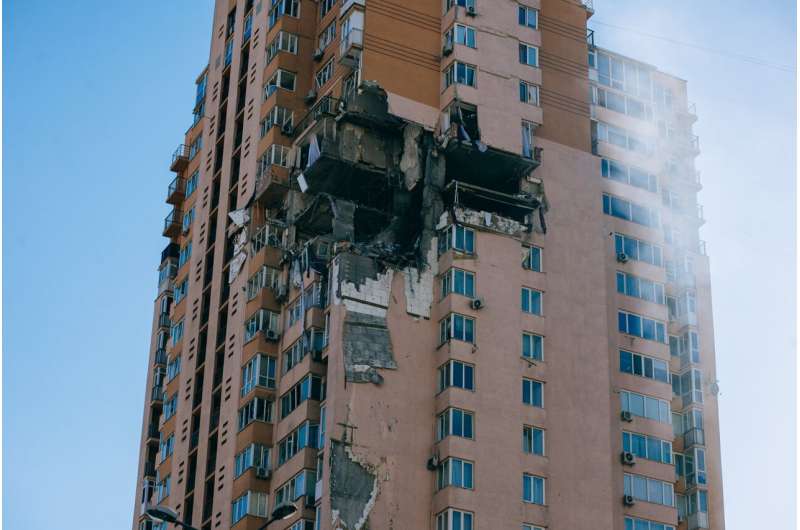This article has been reviewed according to Science X's editorial process and policies. Editors have highlighted the following attributes while ensuring the content's credibility:
fact-checked
proofread
War in Ukraine is increasing the prevalence of mental health conditions in children, new study finds

A new study presented at the European Psychiatric Association Congress 2024 reveals a significant rise in mental health issues among children and adolescents displaced by the war in Ukraine. The research, conducted by the Institute of Forensic Psychiatry of MoH of Ukraine, highlights the devastating impact of prolonged exposure to violence and displacement on the mental well-being of young people.
As per UNICEF's recent report on "The State of the World's Children 2021," the current COVID-pandemic is considered the tip of the mental health iceberg for young people across the world. The war in Ukraine is taking a devastating mental toll on children across Europe. Beyond those directly in the conflict zone, the constant media coverage spreads fear and anxiety, fueling a hidden mental health crisis. This weighs heavily on children already burdened by the lingering impacts of the COVID-19 pandemic.
Experiences of war and military aggression can have a long-term and persistent impact on the physical and mental health of children, with far-reaching and long-term consequences for their development. These consequences can stem from a variety of challenges such as inadequate health care, malnutrition, infectious diseases, and familial distress, all of which can have a significant impact on mental health.
Key findings from the study include:
- The study examined 785 teenagers displaced from war-torn regions of Ukraine.
- Researchers observed a significant increase in the prevalence of various mental health conditions over a period of 6 to 12 months following displacement:
- Post-traumatic stress disorder (PTSD): 9.8% to 21.9%
- Attention deficit hyperactivity disorder (ADHD): 10.2% to 12.6%
- Depressive disorders (DD): 22.3% to 33.3%
- Anxiety disorders (AD): 30.8% to 11.5%
- Conduct disorders (CD): 15.4% to 18.0%
- The study also identified female sex and secondary traumatization (exposure to additional traumatic events after displacement) as risk factors for developing depression, pervasive developmental disorders, and ADHD.
- Additionally, the research suggests that children with existing PTSD are more susceptible to developing other mental health conditions and demonstrate increased sensitivity to further traumatic events.
Prof. Igor Martsenkovsky, Head of the Department of Mental Disorders of Children and Adolescents at the SI Institute of Forensic Psychiatry of the Ministry of Health of Ukraine commented on the findings, stating "This study provides important information about the state of mental health in the child population of Ukraine in 2022-2023. About one-third of the child population has clinically relevant problems related to anxiety, traumatic stress, developing depression, conduct behavior and ADHD.
"Key risk factors for these mental health problems include younger age, no longer being in a committed relationship, having fewer positive childhood experiences within one's family context, and experiencing serious disruption to one's life due to Russian aggression."
"These findings paint a concerning picture of the lasting impact of war on the mental health of young Ukrainians. They underscore the urgent need for increased access to mental health services for children and adolescents affected by the war, both within Ukraine and in host countries, specialized support for children with PTSD and other mental health conditions, trauma-informed approaches in education and social services to help children cope with the emotional consequences of war and continued support for families displaced by the war, acknowledging the unique challenges they face in ensuring the well-being of their children," explains Prof. Geert Dom, President of the European Psychiatric Association.
More information: Abstract: A longitudinal study of child and adolescent psychopathology in conditions of the war in Ukraine (O0073)
The European Congress of Psychiatry takes place from 6-9 April 2024 in Budapest, Hungary, and represents Europe's largest congress dedicated to psychiatry, with over 4000 participants: epa-congress.org.


















